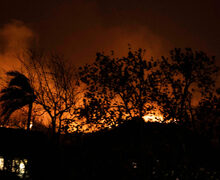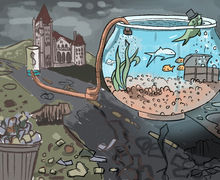Camp Notes: Syracuse begins training camp, navigates around COVID-19
Max Freund | Staff Photographer
Despite the current and impending fallouts from COVID-19, Syracuse is preparing for its Sept. 12 season-opener.
The Daily Orange is a nonprofit newsroom that receives no funding from Syracuse University. Consider donating today to support our mission.
The media won’t have access to Syracuse’s training camp practices this year due to the coronavirus pandemic. Instead, the football team is organizing regular Zoom interviews with head coach Dino Babers and select players while also providing film from the Ensley Athletic Center. With “Camp Notes,” The Daily Orange’s beat reporters bring the latest news, observations and analysis as the Orange gear up for an unprecedented 2020 season. Follow along here and on Twitter.
Nothing speaks to the uncertainty swirling around college football quite like Syracuse lacking a set game schedule until the first day of training camp.
The football team published its 2020 schedule at 9 a.m. on Thursday, hours before the opening practice of camp. The schedule features a road trip to South Bend for Notre Dame, a season opener at North Carolina and a lone nonconference tilt against Liberty.
“I knew who we were going to play, I didn’t know when we were going to play them until basically 45 minutes ago,” head coach Dino Babers told reporters around 1 p.m. on Thursday.
Even Thursday’s schedule seems like a big question mark. Just take the official NCAA language: “All scheduled games are tentative and the times and dates may change because of the coronavirus. Plans on how, when and if college football games will be played are changing, sometimes daily.”
Not exactly reassuring. And without an NBA or NHL-like bubble, with all games played in one location, the season could be perpetually in jeopardy.
“I’m confident that we’ll start,” said Andre Cisco, FBS’ active leader in career interceptions. “We’ll definitely get some games in. Anything can happen from there.”
When walkthroughs ended around noon, players could at last pore over their tentative schedule. They could also check the Twitter replies for their teammate, Cooper Dawson, the first SU athlete to publicly opt-out of the season due to the COVID-19 pandemic.
Despite the current and impending fallouts from COVID-19, Syracuse is preparing for its Sept. 12 season-opener. To get to this point, the Orange wore masks, adhered to social distancing rules, tested often and behaved carefully. SU started voluntary workouts in small groups, called “pods,” to limit contact with each other. The groups grew to include offensive and defensive units and, eventually, the whole team.
Unlike many other programs, SU hasn’t made its players’ test results public. But Babers, Cisco and offensive lineman Airon Servais all praised Syracuse’s protocols.
How confident is Dino Babers that there will be a season?
"Well, I think it all comes down to that magic word of faith. I have faith that our guys can pull it off…
— Danny Emerman (@DannyEmerman) August 6, 2020
“We just finished our 1,200th test,” Babers said. “And I know I’m not allowed to tell you what the number is, but if they were basing a National Championship, Final Four off of COVID testing and who had the lowest number, I really believe we’d be in the Final Four.”
Keeping it under control
If the Orange went to house parties or frequented Marshall Street bars, they might’ve looked more like Rutgers than a team gearing up for a football season.
“I’m very happy with the testing results, and we’ll continue to test weekly to make sure our guys are in good standing,” Babers said. “When you look around the country, you just hope everybody else catches up to the standard we’ve set here up at Syracuse.”
What happens when all students return to campus is a major concern among SEC athletes, according to The Washington Post. Student-athletes, who have more to gain from testing negative than non-athletes, will likely behave more carefully, but their actions may not matter if their classmates are reckless. As prominent athletes, they have to set an example for the rest of campus by wearing masks and making smart decisions, Servais said.
“When the students come back, it’s going to be very hard to keep it all under control,” Cisco said. “So it’s going to take the whole community to stay disciplined to help us work. And on our part, we’re going to have to be very disciplined and choose wisely on where we go and who we hang out with outside the team.”
One precaution the team may take during the season is strategically assigning roommates on the road. For instance, Babers would prefer that quarterback Tommy DeVito rooms with someone who’s been extra careful. Positive COVID-19 tests will result in isolations, and those who’ve been in contact with an infected person will undergo a two-week quarantine.
The situation is delicate and has clear risks. As of now, Dawson is the Orange’s only player to opt-out of the 2020 season, but Babers said there are others who are contemplating it.
The NCAA announced Thursday that colleges and universities must honor the scholarship of any athlete who opts out of the fall season. Divisions and conferences must decide on eligibility rules by Aug. 14.
“I’ve never seen anything like it,” Cisco said of opt-outs. “It’s obviously new because of the pandemic. If guys want to exercise that, then that’s on them. I knew Cooper had announced it. It’s what he felt like he had to do. For myself, I haven’t considered it. I just want to play ball.”
Roster flexibility, creativity will be key
For the next two days, Syracuse will be practicing and walking through plays in helmets and shoulder pads. Then, they’ll be a full-go, Babers said, marking many players’ first time donning full pads since SU’s season-finale win over Wake Forest on Nov. 30.
During the offseason, Syracuse hired Tony White as its defensive coordinator and Sterlin Gilbert as offensive coordinator and quarterbacks coach.
Though Cisco said meetings during quarantine have helped the defense grasp White’s 3-3-5 concept, the lack of spring ball is far from ideal. The Orange’s wide receiver group also lost time to mesh with DeVito. Lack of continuity is a disadvantage, Babers said, and he doesn’t know what to expect for Syracuse’s season-opener in Chapel Hill.
“Something’s going to happen on Sept. 12. It could be really really good, it could be really, really bad on one or both sides of offense and defense,” Babers said.
Babers’ uncertainty of his team’s performance matches that of other college football coaches, who will face challenges in roster management that are unlike anything they’ve experienced. Syracuse’s roster is young, and that comes before any additional opt-outs or seemingly inevitable in-season positive tests. If a cluster of positive tests hits a certain position group, Saturdays could feature a mix of first- and second-stringers.
Coaches must be flexible in changing game plans, Babers said.
“You’re just going to notice that so-and-so’s not out there and so-and-so’s not out there,” Babers said. “You’ve got to find out if they’re in the bathroom and just going to come out late, or if they’re missing the doggone game. And then you’re going to have to adjust and improvise.”
The “next man up” mentality is nothing new for Babers, Servais said. But it could come to an extreme head this year in the worst-case scenario that an outbreak hurts SU’s ability to field a competitive team.
The decision to forfeit a game would have to come from someone above him, Babers said. He would have difficulty walking in front of his team and telling them it’s not worth trying.
That doomsday scenario is just a hypothetical, but it’s a realistic enough possibility to warrant a question at the first press conference of training camp. Because in 2020, when everything is tentative, an industry as infallible as college football can crumble at any moment.
Published on August 6, 2020 at 6:19 pm
Contact Danny: dremerma@syr.edu | @DannyEmerman






